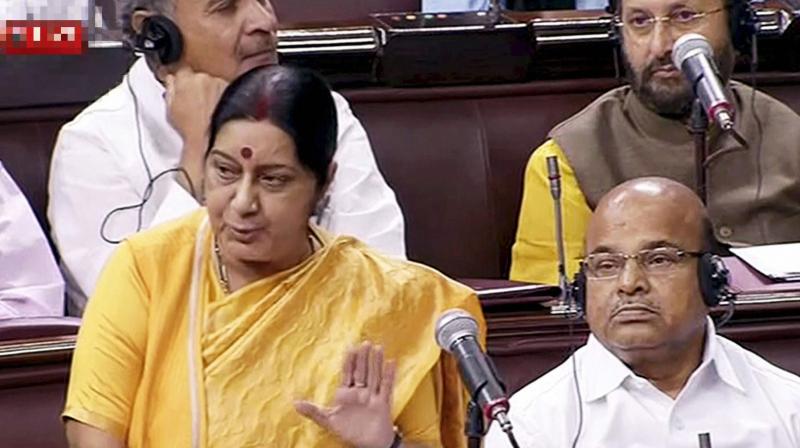Will resolve Doklam issue through talks, not war: Sushma Swaraj in RS
On relations with Pakistan, the external affairs minister ruled out the possibility of bilateral talks until terrorism ends.

New Delhi: External Affairs Minister Sushma Swaraj on Thursday said the standoff between India and China in Doklam area of Sikkim will be resolved through diplomatic channels and negotiation, not war.
Swaraj was speaking in the Rajya Sabha about the BJP-led NDA government’s foreign policy, the discussion on which was started by Congress leader Anand Sharma.
"Bhutan is our neighbour and it wants help with its development. Modi's 'sabka saath, sabka vikaas' policy is not just for Indians but also for our neighbours," Swaraj said.
She also said that the government is not just negotiating on Doklam, but is also talking on the bilateral relations with China.
“War is not a solution to any problem. India-China relations need to be sorted through bilateral talks and negotiation,” she said, responding to Opposition's queries on India's policy on relations with its neighbouring countries.
"The solution will only come from that. Prime Minister Narendra Modi said let us not convert our difference into dispute," she said.
She further stated that Prime Minister Modi is now shaping "global agendas."
"How can the Congress ask us to not oppose the China-Pakistan Economic Corridor ( CPEC)? The previous government's foreign policy was 'PMO' driven," Swaraj said in Rajya Sabha.
"The Chinese are selectively quoting Jawaharlal Nehru's letter. Peace and tranquility with China is important. Doklam can be resolved through bilateral talks," she said.
Swaraj further said that since 2012, Indian Government has not held any discussions on tri-junction with Bhutan and therefore, Chinese action in Doklam area is of "concern."
Speaking on relations with Pakistan, Swaraj ruled out the possibility of bilateral talks with Islamabad until terrorism ends. Pakistan has been time and again held responsible for sponsoring terrorism.
She added that the government had decided to initiate a dialogue with Islamabad last year, but the decision was put on hold when Pakistan's former prime minister Nawaz Sharif called slain Hizbul militant Burhan Wani a martyr.
"At the Heart Of Asia Conference last year, it was decided to start a 'Comprehensive Bilateral Dialogue.' We have always favoured peace talks and have made efforts to maintain stability in the region."
“We adopted the road map of peace and friendship, but it cannot be one-sided. Terrorism and talks can't go together,” the external affairs minister said, adding that the talks will resume only when terrorism ends.
The statement came after the Opposition on Thursday cornered the government in Parliament on the standoff with China and on relations with Pakistan.
Congress leader Anand Sharma sought a reply from Prime Minister Narendra Modi, saying that he "should tell the nation what he discussed with Chinese President Xi Jinping. Even National Security Advisor (NSA) Ajit Doval didn't utter a word on his meeting in China."
China and India have been engaged in the standoff in the Dokalam area near the Bhutan tri-junction for the past one month after a Chinese Army's construction party attempted to build a road. Indian troops stopped road construction by Chinese soldiers on June 16.
On July 2, China emphatically rejected India's interference in its ongoing boundary dispute with Bhutan in the Doklam area and again urged New Delhi to withdraw unconditionally and end the nearly two-month long stand-off.
China alleged that India's intrusion into its territory under the pretext of defending Bhutan's territorial claims, has not only violated Beijing's territorial sovereignty, but also challenged Bhutan's sovereignty and independence.
Indian and Chinese troops continue to be locked in a standoff in Doklam and both sides have moved additional troops, ammunition and military equipment to the area.
The stand-off emerged after Chinese troops were stopped by the Indian Army from constructing roads along the Doklam border.
India claims Sikkim border as part of its territory, while China has said that the area falls on their side as per the 1890 treaty signed between British and China.
Consequently, China suspended the annual Kailash Manasarovar Yatra and conceded that the decision to suspend the pilgrimage was due to the border scuffle.
It also alleged that the Indian troops had crossed the Sikkim sector of the Indo-China border. Beijinghas accused New Delhi of violating a convention signed in 1890 between Britain and China relating to Sikkim and Tibet.

